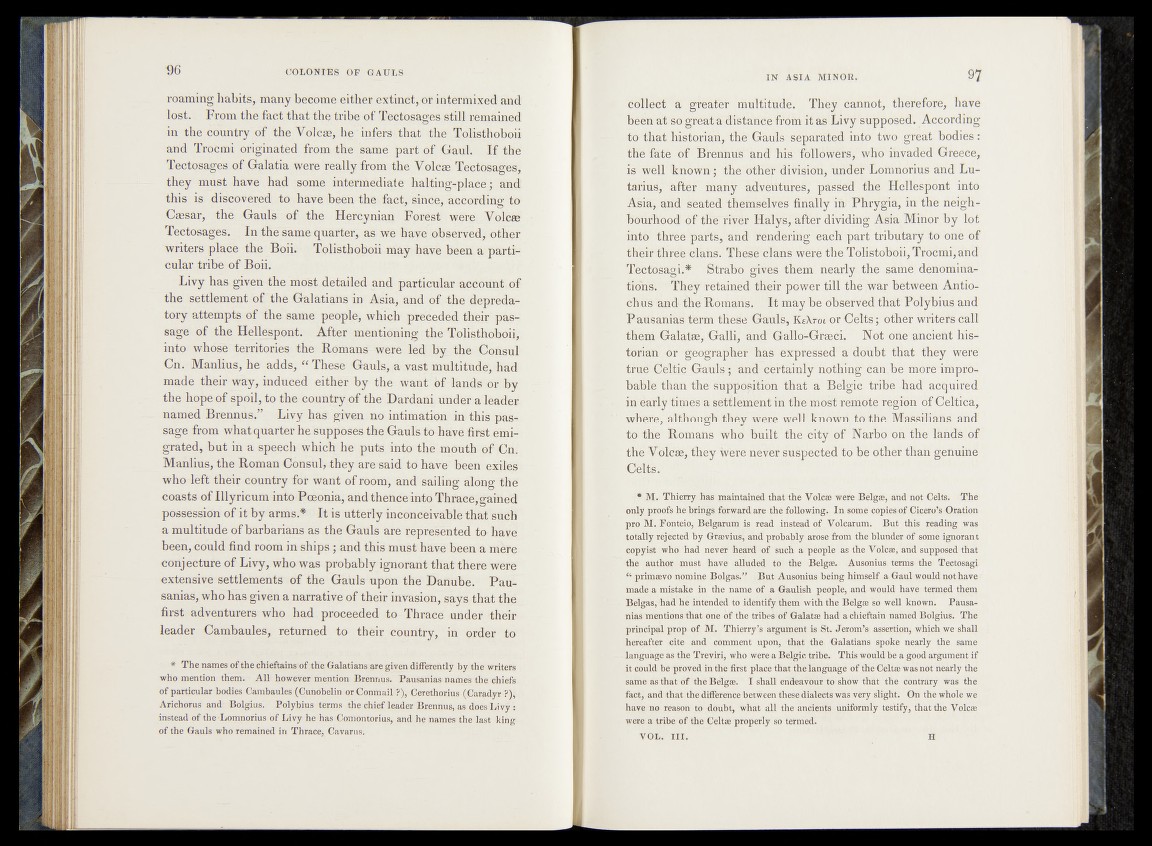
roaming habits, many become either extinct, or intermixed and
lost. From the fact that-the trihe>of Tectosages still remained
in the country of the Vo l cm, in f e r s - th a t the , Tolisthoboii
and Tröcmi originated from the same part of Gai$ft‘ If the
Tectosages of Galatia were really from the Volcae Tectosages,
they mast have had some intermediate halting-plaCe;;, and
this is discovered to have been the fact, s|ncè,.according to
Caesar, the Gauls of the Hereynian Forest we're. Volcae
Tectosages. In the same quarter, as we have observed, other
writers place the Boii. Tolisthoboii may have been a particular
tribe of Boii.
Livy has given the mo'st,detailed and particular account of
the settlement of the Galatians in Asia, and of the depredatory
attempts of the same people, which preceded their passage
of the Hellespont. After mentioning the Tolisthoboii,
into whose territories the Romans-were led b y _ the Consul
Cn. Manlius, he adds, “ These Gauls;’ a vast multitude*,,ihad
made their way, induced either by the want bf lands or fey.
the hope of spoil, to the country of the Dardani under a leader-
named Brennüs.” Livy has' given no intimation in this passage
from what quarter he supposes the Gauls to havé first emigrated,
but in a speech which he puts into the mouth of Cn.
Manlius, the Roman Consul, they are said;tö have been exiles
who left their country for want of room, and sailing along thë
coasts of Illyrieum into Pceonia, and thence into Thrace, gained
possession of it by arms* It is utterly inconceivable thatsïiëh
a multitude of barbarians as the Gauls are represented to havé
been, could find room in ships; and this must have been a mete
conjecture of Livy, who was probably ignorant th a t there were
extensive settlements of the Gauls upon the Danube. Pau-
sanias, who has given a narrative of their invasion, says that thé
first adventurers who had proceeded to Thrace under their
leader Cambaules, returned to their country, in order to
* The names of the chieftains of the Galatians are given differently by the writers
who mention them. All however mention Brennus. Tansanias names the chiefs
of particular bodies Cambaules (CunObelin or Conmail?), Cerethorius (Caradyr ?),
Arichorus and Bolgius. Polybius terms the chief leader Brennus, as does L iv y :
instead of theLomnorius of Livy he has Comöntorius, and he names the last king
of the Gauls who remained in Thrace, Cavarus;
4fflléct a ^rëafer mültjMd^ll Thëy cannot, therefore, have
been ^t“sV|g^at a d i l ^ ^ e lrom it as LiVÿsûpposed. ^ According
. to mbât historian, trie* Gauls^ ^eprfrated intofijfb 'gréât bodiéè:
th^ fétç 'öf Brè^ifs1 ' fen cf ‘hf^'Toll'ó^ers,' who7’'-invadèd Gteéce,
Ip ^ p tÏ^ n ow n ; theftHï@?mf^fêrl, under Lohmorius and Lu-
tariu&/*"fefter many advéinffSf,^ - ülïé Hellespont into
Asia, aiïd^ièMê^ themséï$<Ö' finàny’iti> PnrÿgiilJ în^ïhë neigh-
bournood'fef tlrefîw^ Halysf^fter Hividihg Asia Mfhor hy ^èjf
into"|f#ë,-parts, and! )’endur-m^e<tch^pâït tributa’iyT'to one bf
F 1 ahs. Théfee^clans were the l3^ü^tolTOli,'TroCmi,aUa
Teoips'agi.* tÖtrabd‘7^;.^s.jthem ne'arl^ther:,sarï}e denomida-'
* They* ïrfetfeh|ea| ifipf^p^^er till tue^wüf'bétween' Antio-
c few and the Romans. ’ It m’ay be 'obsei \ ed tllrft Polybiul an'df
P aüsarii'àk term thef^Gam&l^yS-ofof ©élfèf oth'ef '.Wfi'le^â olalT
them Galatæ, Gâlîi, and^^l^b-Gÿæci.^' ’iN^lfeor^ ancient Historian
or^gêo^rapiër^ has éxpfê®B°^'dmpt th af?1 fche'y^wëfe
f/iW’Cëltic G aul^fand certainly înoîhing ,ran,belmore impjcw
bable than the 'that ‘à Belgic trïBévbad' actjuire|J.'
in iafly 'tirnés'a sëfcfJëment in t’Wé region of Celticâ;'
wfeèife, aft^^ig® the-y' werë'wlü krióWnP® tlie MasSlians and
to-tfkfe'Römahs who feuifv éhö ’oity‘ of arfeo oii f h è ^ î^ p ' bf
ftlm ^ ólcse, tfeéy’wèrb suspected to be other fllangébuine
( M t '
* M. Thierry has maintained that the Volcæ were Belgæ, and nét Celts. The
only proofs he brings forward are the following. In some copiesnf Cicero’s Oration
pro M.^Fonteio, Belgium is read instead of i Yolcariim. t Butythis reading was
totally rejected by Grævius, and probably arose from the blunder of .sopje ignoran a
copyist who had never heard of such a people as the Volcæ, and supposed that
the , author- must have alluded* to-the Belgas. Ausonius terms the Tectosagi
“ primævo nomine Boigas.” But Ausonius being himself a Gaul would not have
made a mistake in the name of a Gaulish people, and would have termed them
Belgas, had he intended to identify them with the Belgæ so well known. Pausa-
nias mentions that one bf the tribes‘hf Galatæ had a chieftain named Bolgius'; The
principal prop of M. Thierry’s argument is St. Jerom’s assertion, which we shall
hereafter cite and comment jipon; that the Galatians spoke nearly the same
language as the Treviri, who were a Belgic tribe. This would be a good argument if
it could be proved in the first place that the language of the Celtæ was not nearly the
same as that of the Belgæ. I shall endeavour to show that the contrary was the
fact, and that the difference between these dialects was very slight. On the whole we
have no reason to doubt, what all the ancients uniformly testify', that the Vojeæ
were a tribe of the Celtæ properly so termed.
VOL. I II . H